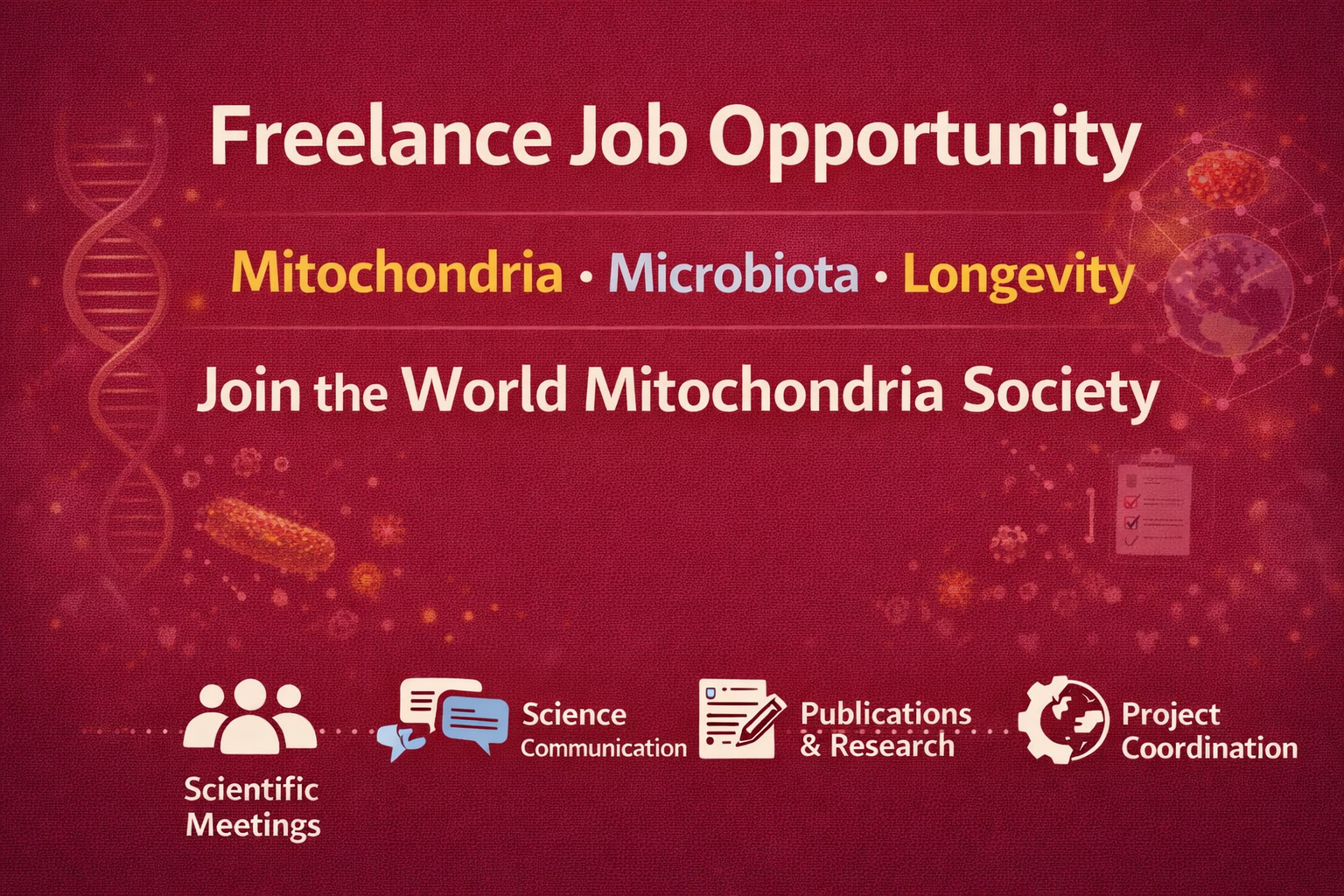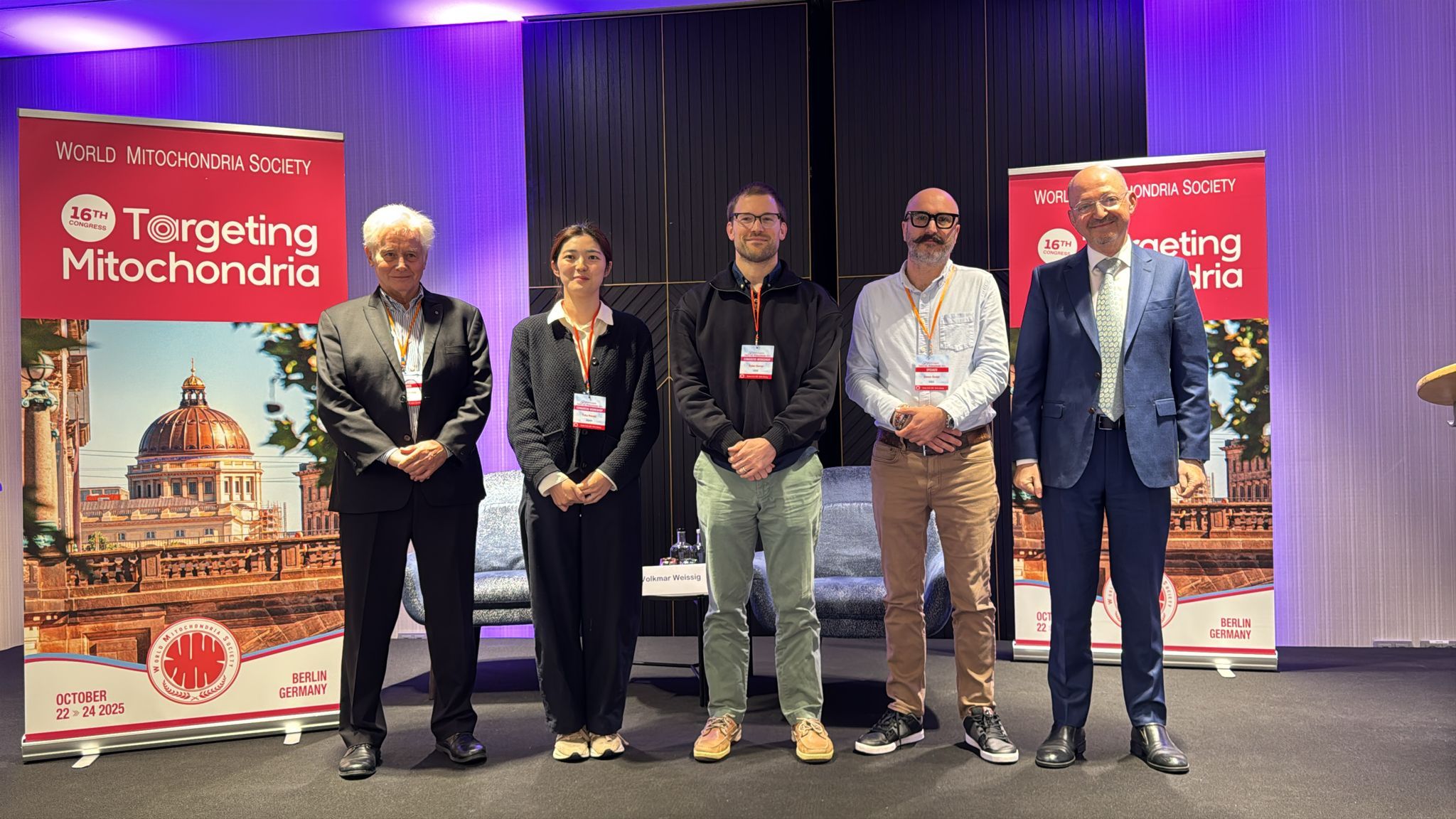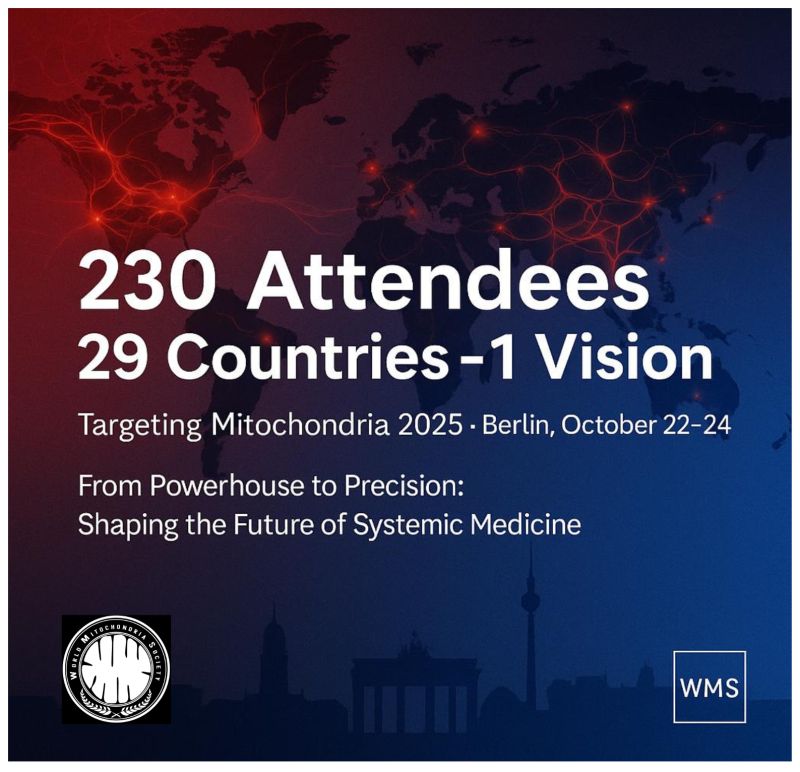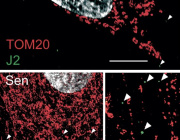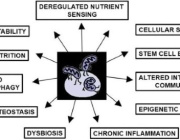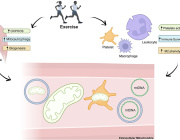Abstracts of Targeting Mitochondria 2024 are Published in the "Journal of Mitochondria, Plastids and Endosymbiosis"

It is a great pleasure to announce that all abstracts accepted at Targeting Mitochondria 2024 are now published in the journal by Taylor & Francis "Journal of Mitochondria, Plastids and Endosymbiosis" - with a DOI !
This publication serves as a lasting record of the innovative research and findings shared during the congress. All abstracts are accessible under a single DOI, ensuring easy reference and seamless access for researchers and professionals around the world.
Access the abstracts: https://doi.org/10.1080/28347056.2024.2422726.
WMS Best Short Oral Presentation: GPCR Agonist CAP-1902 Enhances Mitophagy to Improve Mitochondrial Function in Complex III Deficiency

Congratulations to Cristiane Beninca, the scientific director of the Metabolism and Mitochondria Imaging Core at UCLA. for receiving the Best Short Oral Presentation Award at the 15th Annual World Congress on Targeting Mitochondria! Her research introduces a novel approach to treating mitochondrial dysfunction by activating selective mitophagy.
In this study, Beninca and her team demonstrated that CAP-1902, an agonist of the MAS G-protein-coupled receptor (MASR), can selectively induce mitophagy in cells with complex III deficiency, a common mitochondrial dysfunction. Activation of MASR by CAP-1902 stimulated the AMPK/ULK1/FUNDC1 pathway, promoting mitochondrial biogenesis and turnover, which ultimately improved cellular bioenergetics and reduced mitochondrial stress. This innovative approach could pave the way for new GPCR-mediated therapies targeting mitochondrial diseases.
Dr. Beninca stated "Our core's mission is to provide access to state-of-the-art microscopes, training, and comprehensive services for mitochondrial imaging techniques in collaboration with academia and industry. Our research projects focus on discovering new pathological processes and exploring potential treatments for mitochondrial disorders."
This research highlights the therapeutic potential of selective mitophagy in addressing mitochondrial disorders and enhancing cellular health.
Exploring Mitochondria-Containing Extracellular Vesicles in Alzheimer’s Disease Wins WMS Best Poster Presentation (2)

Congratulations to Tingting Chen from the University of Groningen, Netherlands, for receiving the Best Poster Presentation Award at the 15th Annual World Congress on Targeting Mitochondria!
Her groundbreaking research investigates mitochondria-containing extracellular vesicles (mitoEVs) and their role in Alzheimer's disease (AD).
Chen’s study involved isolating mitoEVs from neural progenitor cells (NPCs) derived from an AD patient with a PSEN1 mutation and comparing them with control cells. While no significant differences were observed in protein concentrations or particle sizes, proteomic analysis revealed a greater diversity of proteins in control EVs.
Dr. Chen stated to the WMS:
"Alzheimer’s disease (AD) affects millions of people worldwide and we do not have a cure for it. Dysfunctional intercellular communication contributes to the pathology of the disease. Extracellular vesicles (EVs) are now recognized as key components in cell–cell communication. During my research I investigate the role of mitochondria-containing EVs in AD pathology. Through proteomic analysis of EVs derived from the neural progenitor cells (NPCs) with the PSEN1 ΔE9 mutation, I aim to identify potential biomarkers for AD. This work aims to shed light on the connection between mitochondrial proteins in EVs and mitochondrial health within cells.
Ultimately, I hope to demonstrate the potential of mitochondria-containing EVs as a promising tool for tracking disease progression in early-stage AD."
Gallbladder Mitochondrial Function as a Predictor of Liver Transplantation Outcomes Wins WMS Best Poster (2)
 |
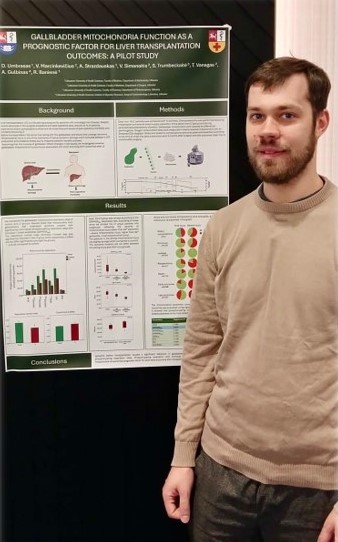 |
The World Mitochondria Society is excited to announce that Danielius Umbrasas from the Lithuanian University of Health Sciences received the Best Poster Presentation Award at the 15th WMS Annual Meeting on Targeting Mitochondria for his research on gallbladder mitochondrial function as a prognostic factor for liver transplantation (LT) outcomes.
Dr. Danielius Umbrasas and his team are investigating the connection between mitochondrial damage in the biliary system and patient outcomes following liver transplantation. Recognizing that up to 30% of patients experience biliary complications post-transplant, he questioned whether bioenergetic parameters in biliary tissues might serve as predictors for these issues. He specifically focused on mitochondrial respiratory rates, given that donor livers are subjected to ischemia before transplantation, with mitochondria being critical players in ischemia-reperfusion injury.
“To better understand this, Dr. Umbrasas utilized gallbladder mucosa as a representative for the biliary system in the liver. His research revealed that following ischemia-reperfusion, respiratory rates in gallbladder mitochondria show a significant decrease, particularly in Complex I-driven phosphorylating respiration. He identified an inverse correlation between this respiratory rate and poor early patient outcomes, including biliary strictures, leakage, and the need for repeat surgeries. Dr. Umbrasas is hopeful that these insights might one day assist in clinical settings to improve prediction of liver transplant outcomes.
Dr. Umbrasas shared with the WMS: "Looking forward, we plan to compare traditional cold static preservation with a newer method—cold machine perfusion—to assess any potential benefits of this approach on gallbladder mitochondrial function and patient recovery, both in the short and long term."
Nominations for Best Mitochondria Image 2024

1. Never Tear Us Apart
By Una Rastovic, The Roger Williams Institute of Liver Studies, King's College London & Foundation for Liver Research, London, UK
Study Context: The image depicts the mitochondrial network (TOM20, shown in orange) and Drp1 (in purple) within a proliferating hepatic stellate cell. Hepatic stellate cells are the primary producers of extracellular matrix (ECM) in liver fibrosis. During their activation in the fibrogenic process, these cells undergo proliferation, metabolic changes, and begin producing collagen along with other ECM proteins. This study seeks to investigate mitochondrial alterations during hepatic stellate cell activation, with the goal of developing mitochondria-targeted therapies for liver fibrosis.
2. Mitochondrial Networks and Communication between Cardiac Fibroblasts
By Aybuke Celik, Research Fellow at Department of Cardiac Surgery in Boston Childrens Hospital/ Harvard Medical School
Study Context: This image reveals the complex mitochondrial network within cardiac fibroblasts (Mitotracker Red CMXRos). The central fibroblast extends its network toward neighboring cells, illustrating the dynamic intercellular communication essential for cellular energy metabolism and signal transduction. The image also highlights the cell membrane and cytoskeletal structures (Cell Mask Green), emphasizing the scaffolding that facilitates these cellular interactions. This visual insight underscores the pivotal role mitochondria play in cardiac fibroblast function, contributing to cardiac homeostasis and the maintenance of cellular signaling.
3. Mitochondrial network, a solar symphony and the nucleus, a lunar presence
By Nada Dhaouadi, PhD Student in the Histology laboratory at the polytechnic university of marches, under the supervision of Pr. Saverio Marchi
Study Description: In this captivating image, we observe the intricate architecture of mitochondria within a breast cancer cell, where the dynamic interplay between cellular structures creates a striking visual metaphor reminiscent of celestial bodies. The mitochondrial network, depicted in vibrant hues, radiates outward like the sun's rays, symbolizing energy production and vitality. Each mitochondrion appears as a luminous orb, interconnected in a web that suggests both strength and fragility. This network is not just a source of power for the cell; it embodies the relentless drive of cancer cells to proliferate and thrive, much like the sun's relentless energy that fuels life on Earth. In contrast, the nucleus stands out as a serene and powerful presence, akin to the moon illuminating the night sky. Its distinct shape and darker tones create a focal point within the chaotic beauty of the mitochondrial network. The nucleus houses the genetic material that dictates cellular function and behavior, representing both control and mystery—much like the moon's influence over tides and cycles. Together, the mitochondria and nucleus form a cosmic relationship within the breast cancer cell. The sun-like mitochondria provide energy and vitality, while the moon-like nucleus governs cellular processes with an enigmatic authority. This imagery not only highlights the complexity of cancer biology but also invites reflection on the dualities present in nature—light and dark, energy and control, chaos and order.
4. Mitochondria Movement in Neurons
By Gaurav Verma, Department of Neuroscience and Physiology, Gothenburg University, Sweden
Study Description: Primary cortical neurons are grown in the coated (Poly-D-Lysin+Laminin) imaging plates and stained with MitoTracker Red, where we get a fascinating look at their energy production and overall health. MitoTracker Red is a special dye that stains active mitochondria. In neurons, this staining technique shows a complex network of mitochondria spread throughout the cell body, (axons and dendrites), highlighting where energy is being used the most. This allows us to track the movement of mitochondria movements from one neuron to others.
5. Mitochondrial Highways: Powering the Neuronal Network
By Amandine Grimm, Research Cluster Molecular and Cognitive Neurosciences, Department of Biomedicine, University of Basel, Switzerland
The image depicts a culture of induced pluripotent stem cells (iPSC)-derived neurons. The gray color indicates the nucleus (DAPI staining), the cyan color represents the neuronal marker MAP2 (microtubule-associated protein 2 staining), and the orange color represents the mitochondria (TOMM20 staining).
Study context: Our study aimed to investigate whether the mitochondrial aging signature is retained in iPSC-derived neurons from aged donors. IPSCs from both young and aged donors were differentiated into neurons before the assessment of mitochondria parameters. Notably, neurons from aged donors displayed mitochondrial dysfunction, including reduced ATP, mitochondrial membrane potential, and respiration, as well as increased free radicals and mitochondrial mass, and fragmented mitochondrial network compared to neurons from young donors. Our study indicates that aged iPSC-derived neurons could be a valuable tool for studying neuronal aging of mitochondrial parameters in vitro.
6. Forever young: Unravelling the lights of the eternal youth
By Vanessa López Polo, PhD student, Cellular Plasticity and Disease Laboratory, Institute for Research in Biomedicine (IRB), Barcelona, Spain
Senescent cell. Mitochondria was stained using mitotracker (magenta), mtDNA was stained using dsDNA antibody (green) and DNA was stained with DAPI (blue). Magnification: mtDNA staining resembles fireflies travelling along highly interconnected bridges which are mitochondria.
Study context: Senescent cells are used to study biological processes related to cellular aging and age-relate diseases. Senescent cells present an increase in the mitochondrial mass, increased in mtDNA number and hyperfused mitochondrial networks. Some cells present multiple nuclei.
7. Disruption of the Mitochondrial Network in Oxidative Stress-Induced Senescent Melanocytes
By Ines Martic, Institute for Biomedical Aging Research, Universität Innsbruck, Innsbruck, Austria
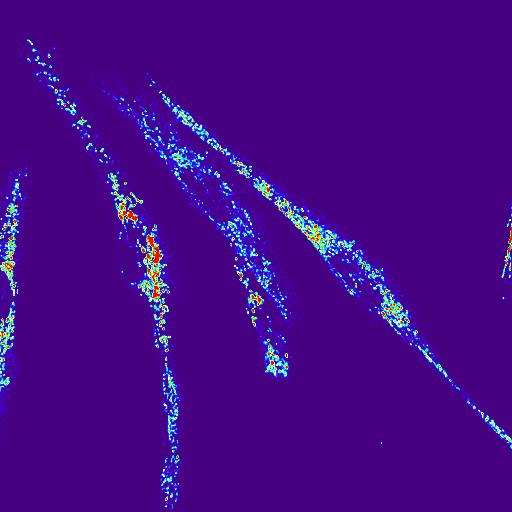
This complex V immunofluorescence image (60x magnification) in tBHP-treated melanocytes, highlights the mitochondrial network, with visible signs of increased fragmentation—an indicator of mitochondrial dysfunction associated with oxidative stress-induced senescence.
Study context: The study focuses on oxidative stress-induced senescence in melanocytes using tert-butyl hydroperoxide (tBHP) as a proxy for cigarette smoke exposure. Upon induction of senescence in melanocytes, the team aims to understand their role in skin aging and age-related pigmentation disorders. The observed mitochondrial fragmentation in tBHP-treated cells provides insight into how oxidative stress contributes to the cellular senescence, impairing mitochondrial function and promoting age-related phenotypes.
8. Parking Lot
By Dipti Baskar, National Institute of Mental Health and Neuro Sciences (NIMHANS), Bengaluru, India
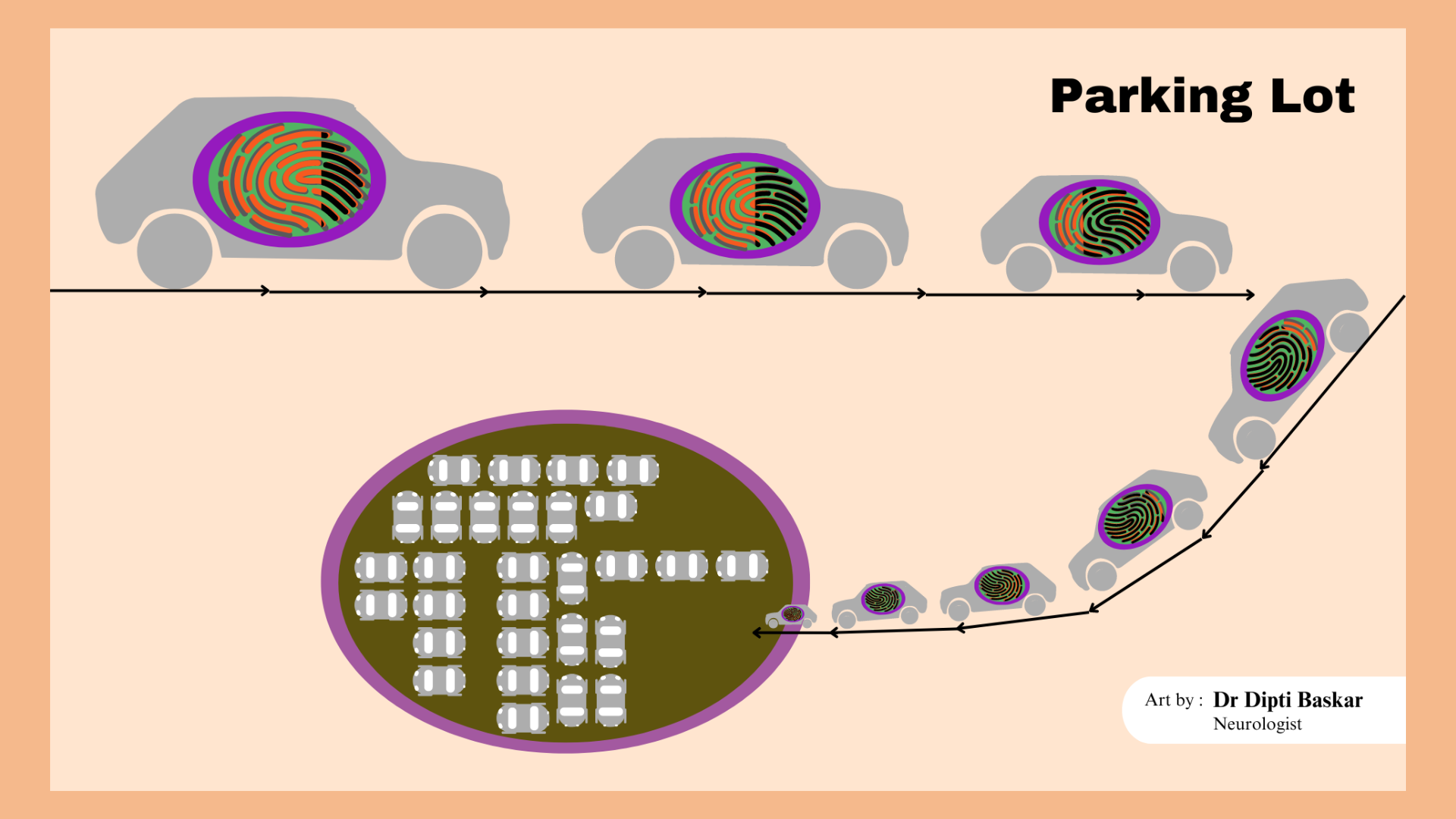
Description: Genetic abnormalities in Mitochondria, the "Power house" of the cell, result in "Power failure" of the body machinery. This can lead to paracrystalline inclusions called "Parking lot" inclusions within the abnormal mitochondria commonly noted in mitochondrial myopathy which is represented in this digital artwork.
Targeting Mitochondria 2024 Congress
October 29-31, 2024 - Berlin, Germany
wms-site.com
Report Book & Replay of the Workshop are Now Available

Workshop Access - How to Evaluate Mitochondria Function?
If you couldn't join the workshop, the materials are now available for purchase.
- Benefit from a 3 weeks access to the workshop. The recording includes 3+ hours on "How to Evaluate Mitochondria Function?"
- Access the Report Book of the workshop. It contains all PowerPoint slides discussed during the workshop, as well as the full bibliography and useful protocols.
Posters List of Targeting Mitochondria 2024
More than 112 communications were presented during Targeting Mitochondria 2024, including more than 70 posters. Access full posters list.
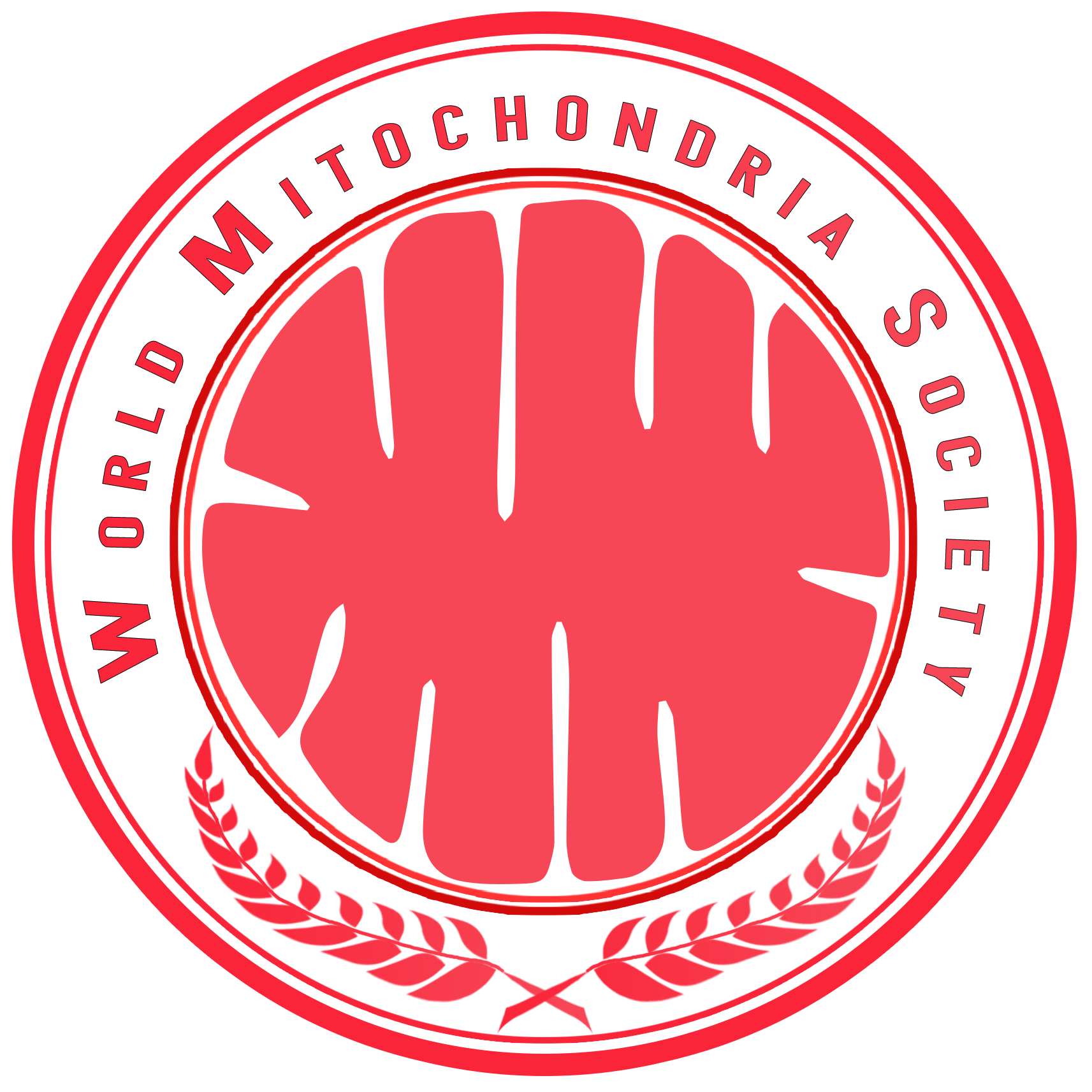 World Mitochondria Society
World Mitochondria Society
Annual World Congress on Targeting Mitochondria
LinkedIn | Facebook
World Mitochondria Society 2024 Keynote Speaker Day 1: Prof. Eric Schon
 WMS is happy to welcome Prof. Eric Schon from Columbia University, USA, as a keynote speaker on Day 1 of Targeting Mitochondria 2024 in Berlin this October.
WMS is happy to welcome Prof. Eric Schon from Columbia University, USA, as a keynote speaker on Day 1 of Targeting Mitochondria 2024 in Berlin this October.
Prof. Schon will deliver a presentation titled "Mitochondria in Alzheimer disease: it's not what you think"
The dominant hypothesis of Alzheimer disease (AD) pathogenesis invokes the accumulation of a cleavage product of the amyloid precursor protein (APP), called beta-amyloid, as the driver of pathogenesis. However, the poor track record of clinical trials based on this hypothesis suggests that other causes likely underlie the disease. We propose an alternative hypothesis in which a different APP cleavage product, called C99, is the main culprit, via its role as a regulator of cellular cholesterol metabolism. In AD, both C99 production and cellular cholesterol levels are increased well above normal levels, resulting in essentially all of the biochemical and clinical features of the disease. From this perspective, AD is, at bottom, a lipid disorder.
About Eric Schon
Eric Schon, a professor of Neurology and Genetics, has focused on the intricacies of mitochondrial genetics, highlighting their unique semi-autonomous nature governed by both nuclear and mitochondrial DNA. Mitochondria, once bacteria, contribute to cellular energy production through oxidative phosphorylation. Schon's research explores various inherited and sporadic mitochondrial disorders, employing innovative techniques like cytoplasmic hybrids. Recently, his focus shifted to Alzheimer's disease, uncovering heightened ER-mitochondrial communication as a potential key player in its pathogenesis, offering insights into diagnosis and treatment.
World Mitochondria Society
Annual World Congress on Targeting Mitochondria
LinkedIn | Facebook
World Mitochondria Society 2024 Keynote Speaker Day 2: Prof. Howy Jacobs
 It is with great pleasure that we welcome Prof. Howy Jacobs from Tampere University, Finland, as a keynote speaker on Day 2 at Targeting Mitochondria 2024 in Berlin this October.
It is with great pleasure that we welcome Prof. Howy Jacobs from Tampere University, Finland, as a keynote speaker on Day 2 at Targeting Mitochondria 2024 in Berlin this October.
Prof. Jacobs has documented "A century of mitochondrial research, 1922–2022" in the Enzymes Book Series (2023). The chapter discussed the comprehensive research history of mitochondria, starting from their initial recognition as resembling bacteria in 1922, to their integration into cell physiology today, highlighting major advances in various scientific fields such as biochemistry, genetics, pathology, and cell biology.
Keynote Speech: "Mitochondria: More Heat Than Light?"
"Mitochondria are not just producers of ATP or clearing houses of intermediary metabolism. Here I will trace the history of how mitochondria have come to be regarded as key contributors to cell and organismal physiology, and how recent findings have opened up new chapters in our thinking" stated Prof. Jacobs.
Prof. Jacobs will discuss the implications of elevated mitochondrial temperature for evolution, development, cell signaling, immunity and pathology.
© Photo Credits: Rami Hanafi
World Mitochondria Society
Annual World Congress on Targeting Mitochondria
LinkedIn | Facebook
Stem Cell Educator Therapy: A New Era in Mitochondrial Transfer and Regeneration
 Dr. Yong Zhao, Throne Biotechnologies, will be joining Targeting Mitochondria 2024 this October in Berlin.
Dr. Yong Zhao, Throne Biotechnologies, will be joining Targeting Mitochondria 2024 this October in Berlin.
Dr. Zhao will be sharing his latest research on stem cells and mitochondrial transfer in a talk entitled "Stem Cell Educator Therapy: A New Era in Mitochondrial Transfer and Regeneration".
Presentation Highlights
1. Stem Cell Educator (SCE) therapy is the only therapy to date to safely and efficiently correct autoimmunity and restore β cell function in recent onset T1D patients.
2. Clinical data provided the visual evidence regarding the immune education of SCE therapy, leading the long-lasting improvement of hair regrowth in subjects with moderate or severe alopecia areata (AA).
3. SCE therapy has the potential to revolutionize the treatment of patients with other autoimmune and inflammatory- or aging-associated diseases caused by mitochondrial dysfunctions, without the safety and ethical concerns associated with conventional immune and/or stem cell-based approaches.
Join us to know more! Speakers Lineup.
World Mitochondria Society
Annual World Congress on Targeting Mitochondria
LinkedIn | Facebook
Cellular Dynamics: The Synergistic Interplay of Iron, Mitochondria, and Ferroptosis in Health and Disease

Prof. Carsten Culmsee, University of Marburg, Germany, and active member of the WMS Scientific Committee will be joining Targeting Mitochondria 2024 this October in Berlin.
Presentation title: Cellular Dynamics: The Synergistic Interplay of Iron, Mitochondria, and Ferroptosis in Health and Disease.
World Mitochondria Society
Annual World Congress on Targeting Mitochondria
LinkedIn | Facebook
Mitochondrial Extracellular Vesicles: Orchestrating Brain Plasticity and Recovery
 Prof. Stefano Pluchino, University of Cambridge, United Kingdom, will be joining Targeting Mitochondria 2024 this October in Berlin.
Prof. Stefano Pluchino, University of Cambridge, United Kingdom, will be joining Targeting Mitochondria 2024 this October in Berlin.
Prof. Pluchino will be sharing his latest research on the role of mitochondrial extracellular vesicles in brain plasticity and recovery, during the session dedicated to "Emerging Trends and Strategies in Mitochondria Research".
In his talk Prof. Pluchino will cover the the following:
- Extracellular vesicles from neural stem cells transfer IFN-g via Ifngr1 to activate Stat1 signalling in target cells
- Extracellular vesicles are independent metabolic units delivering functional Asparaginase-like protein 1n
- NSCs deliver functional mitochondria to target cells via EVs
World Mitochondria Society
Annual World Congress on Targeting Mitochondria
LinkedIn | Facebook
Mitochondria Delivery via Extracellular Vesicles to the Blood-Brain Barrier
 Dr. Devika S Manickam, Duquesne University, USA, and active member of the WMS Scientific Committee will be joining Targeting Mitochondria 2024 this October in Berlin.
Dr. Devika S Manickam, Duquesne University, USA, and active member of the WMS Scientific Committee will be joining Targeting Mitochondria 2024 this October in Berlin.
Presentation title: Mitochondria Delivery via Extracellular Vesicles to the Blood-Brain Barrier
Highlights
- Role of extracellular vesicles (EVs) in intercellular communication and drug delivery.
- Incorporation of mitochondria small EVs (<200 nm) and medium-to-large EVs (m/lEVs >200 nm) EVs during biogenesis.
- Potential of m/lEVs to deliver healthy mitochondria for treating neurodegenerative, cardiovascular, and metabolic diseases.
- Advantage of m/lEVs using endogenous mechanisms for cellular repair.
- Impact of ischemic stroke on mitochondrial function in blood-brain barrier endothelial cells.
- Efficacy of human brain endothelial cells (BEC) -derived mitochondria-containing EVs in mouse stroke models.
- Improved therapeutic outcomes with species-specific EVs (mouse BEC-EVs) in stroke models.
- Support for using m/lEVs to enhance therapeutic potential in preclinical studies.
World Mitochondria Society
Annual World Congress on Targeting Mitochondria
LinkedIn | Facebook
Mitochondrial Transplantation Mediates Improved Cellular Energy Metabolism, Restoration of Mitochondrial Function and Prevention of Cell Death
 It is a great pleasure to welcome Dr. Mark Kindy, U.S. Department of Veterans Affairs James A. Haley VA Hospital and University of South Florida, USA at Targeting Mitochondria 2024 this October in Berlin.
It is a great pleasure to welcome Dr. Mark Kindy, U.S. Department of Veterans Affairs James A. Haley VA Hospital and University of South Florida, USA at Targeting Mitochondria 2024 this October in Berlin.
Presentation title: Mitochondria Iron Metabolism: Mitochondrial Transplantation Mediates Improved Cellular Energy Metabolism, Restoration of Mitochondrial Function and Prevention of Cell Death
In his talk Dr. Kindy will cover:
- Isolation and characterization of mitochondria
- Application of mitochondrial transplantation
- Reversal of cellular dysfunction
- Restoration of energy metabolism
Dr. Kindy is a collaboration partner of the WMS supporter 2024 "MitoSense". About Mitosense.
Targeting Mitochondria 2024 program.
World Mitochondria Society
Annual World Congress on Targeting Mitochondria
LinkedIn | Facebook
Cracking the Code of Aging: Exploring Mitochondrial Dynamics and Organelle Connections
 It is a great pleasure to welcome Dr. Antentor Hinton, Vanderbilt University, USA, at Targeting Mitochondria 2024 this October in Berlin.
It is a great pleasure to welcome Dr. Antentor Hinton, Vanderbilt University, USA, at Targeting Mitochondria 2024 this October in Berlin.
Presentation title: Cracking the Code of Aging: Exploring Mitochondrial Dynamics and Organelle Connections.
Highlights
- Overview of the current understanding regarding mitochondrial structural changes during aging.
- Summary of the altered structural changes that occur with age in cristae architecture and their impact on mitochondrial calcium signaling.
- Implications of how aging modifies organelle contact communication.
- Illustration of how the MICOS (mitochondrial contact site and cristae organizing system) complex influences physiology and metabolism throughout the aging process.
More information on Dr. Hinton's latest research.
World Mitochondria Society
Annual World Congress on Targeting Mitochondria
LinkedIn | Facebook
More Articles...
- Blood-Based Marker: Mitochondrial DNA Damage in Parkinson’s Disease
- The Role of Mitochondria in Zika Virus Propagation: Mechanisms of Immune Evasion and Inter-Cellular Transmission
- Dynamics of Mitochondria: Regulation of Nucleoid Morphology to Protect Mitochondrial Function
- New Biosensing Solutions and Optimized Pharmacological Inhibitors to Counteract Mitophagy in Cancer Cells







